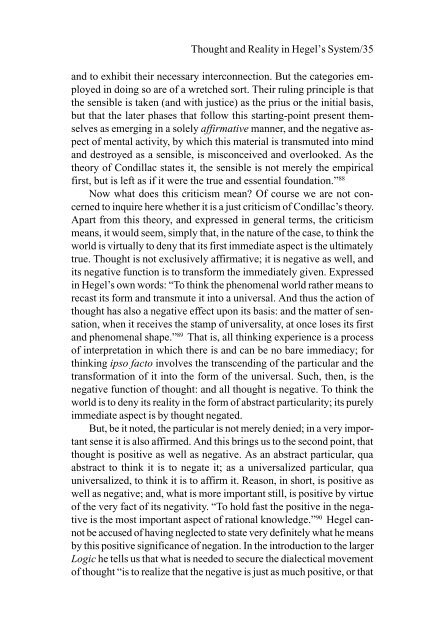Thought and Reality in Hegel's System
Thought and Reality in Hegel's System
Thought and Reality in Hegel's System
- No tags were found...
You also want an ePaper? Increase the reach of your titles
YUMPU automatically turns print PDFs into web optimized ePapers that Google loves.
<strong>Thought</strong> <strong>and</strong> <strong>Reality</strong> <strong>in</strong> Hegel’s <strong>System</strong>/35<strong>and</strong> to exhibit their necessary <strong>in</strong>terconnection. But the categories employed<strong>in</strong> do<strong>in</strong>g so are of a wretched sort. Their rul<strong>in</strong>g pr<strong>in</strong>ciple is thatthe sensible is taken (<strong>and</strong> with justice) as the prius or the <strong>in</strong>itial basis,but that the later phases that follow this start<strong>in</strong>g-po<strong>in</strong>t present themselvesas emerg<strong>in</strong>g <strong>in</strong> a solely affirmative manner, <strong>and</strong> the negative aspectof mental activity, by which this material is transmuted <strong>in</strong>to m<strong>in</strong>d<strong>and</strong> destroyed as a sensible, is misconceived <strong>and</strong> overlooked. As thetheory of Condillac states it, the sensible is not merely the empiricalfirst, but is left as if it were the true <strong>and</strong> essential foundation.” 88Now what does this criticism mean? Of course we are not concernedto <strong>in</strong>quire here whether it is a just criticism of Condillac’s theory.Apart from this theory, <strong>and</strong> expressed <strong>in</strong> general terms, the criticismmeans, it would seem, simply that, <strong>in</strong> the nature of the case, to th<strong>in</strong>k theworld is virtually to deny that its first immediate aspect is the ultimatelytrue. <strong>Thought</strong> is not exclusively affirmative; it is negative as well, <strong>and</strong>its negative function is to transform the immediately given. Expressed<strong>in</strong> Hegel’s own words: “To th<strong>in</strong>k the phenomenal world rather means torecast its form <strong>and</strong> transmute it <strong>in</strong>to a universal. And thus the action ofthought has also a negative effect upon its basis: <strong>and</strong> the matter of sensation,when it receives the stamp of universality, at once loses its first<strong>and</strong> phenomenal shape.” 89 That is, all th<strong>in</strong>k<strong>in</strong>g experience is a processof <strong>in</strong>terpretation <strong>in</strong> which there is <strong>and</strong> can be no bare immediacy; forth<strong>in</strong>k<strong>in</strong>g ipso facto <strong>in</strong>volves the transcend<strong>in</strong>g of the particular <strong>and</strong> thetransformation of it <strong>in</strong>to the form of the universal. Such, then, is thenegative function of thought: <strong>and</strong> all thought is negative. To th<strong>in</strong>k theworld is to deny its reality <strong>in</strong> the form of abstract particularity; its purelyimmediate aspect is by thought negated.But, be it noted, the particular is not merely denied; <strong>in</strong> a very importantsense it is also affirmed. And this br<strong>in</strong>gs us to the second po<strong>in</strong>t, thatthought is positive as well as negative. As an abstract particular, quaabstract to th<strong>in</strong>k it is to negate it; as a universalized particular, quauniversalized, to th<strong>in</strong>k it is to affirm it. Reason, <strong>in</strong> short, is positive aswell as negative; <strong>and</strong>, what is more important still, is positive by virtueof the very fact of its negativity. “To hold fast the positive <strong>in</strong> the negativeis the most important aspect of rational knowledge.” 90 Hegel cannotbe accused of hav<strong>in</strong>g neglected to state very def<strong>in</strong>itely what he meansby this positive significance of negation. In the <strong>in</strong>troduction to the largerLogic he tells us that what is needed to secure the dialectical movementof thought “is to realize that the negative is just as much positive, or that
















